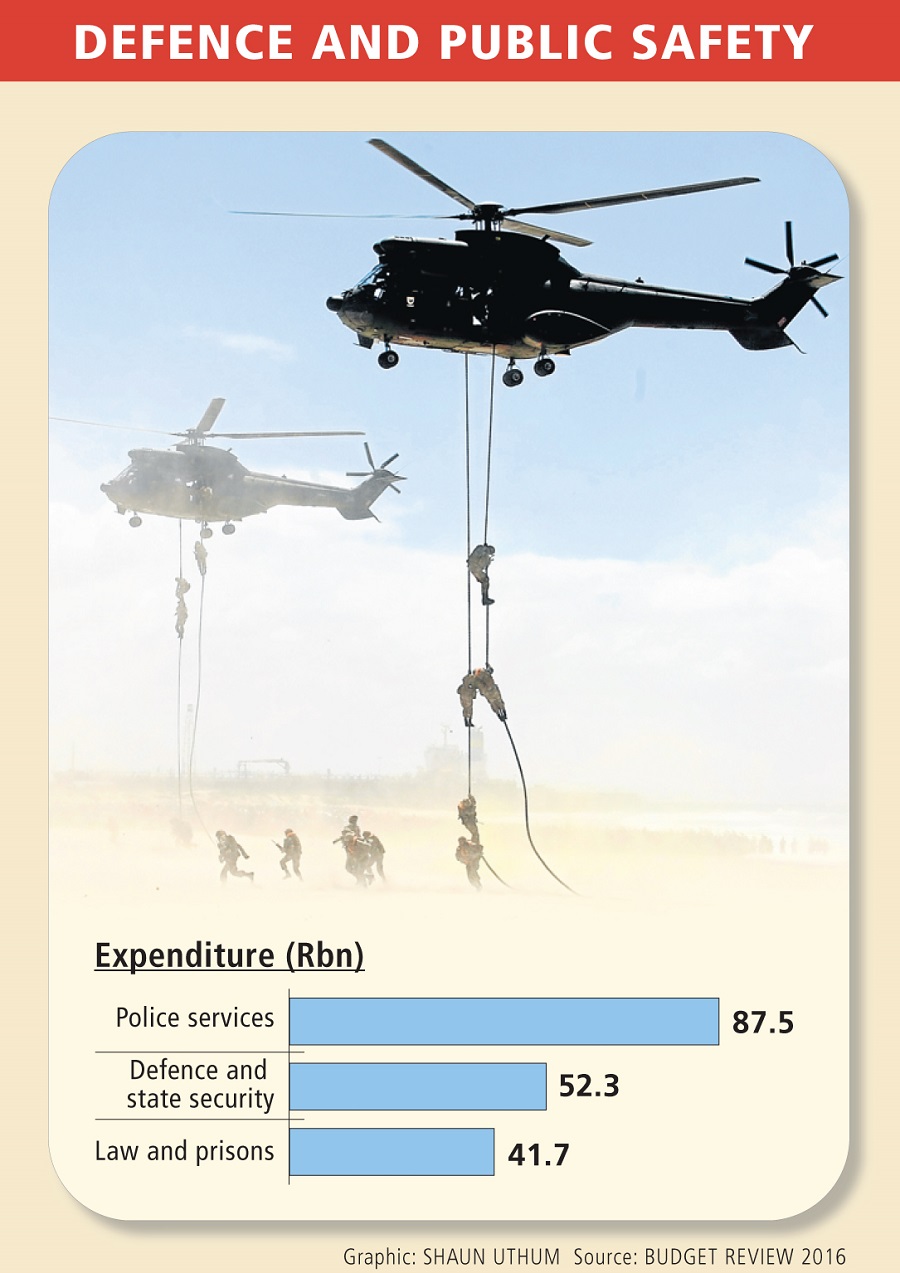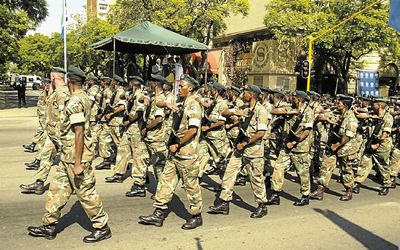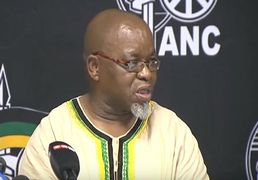THE South African National Defence Force (SANDF) will in the next three years come under increasing pressure to maintain its peace-keeping missions following an effective 3% cut in its budget allocation. It was also recorded that in order to do with less money, it would have to have fewer employees.
All the departments in the defence, public order and safety sector are in a similar position of not keeping pace with inflation but the real reduction in spending is not as severe as the one in the SANDF budgets for the medium-term expenditure framework ending in 2018-19.
At present, the SANDF is involved in five peace-support operations in the Democratic Republic of Congo, Sudan and in the Mozambique channel for antipiracy operations, at a cost of R4.6bn over the medium term.
The South African Police Service (SAPS) budget almost keeps pace with inflation, increasing 6.6% over the medium term, while the allocation for the courts and correctional services is in a similar position, growing 6.5% over the three years. Inflation is estimated at 6.8%.

The budget review says the National Development Plan called for safer communities through an effective criminal justice system and police services responsive to community needs and "spending on defence, public order and safety will grow from R171.5bn in 2015-16 to R203.6bn in 2018-19. This function will grow at an average annual rate of 56.9%."
About 49% of the money goes to the SAPS. Following the findings of the Farlam Commission of Inquiry into the fatal shooting of 34 striking miners at Marikana in 2012, the SAPS has established an international panel of experts to review and amend all prescripts relevant to public order policing in line with international best practice.
"An additional amount of R597.8m over the medium term has been allocated to the SAPS to strengthen public order policing. This will also support the implementation of the recommendations of the Farlam Commission."
The review also notes that because the defence, public order and safety group was labour intensive, the compensation of employees was its largest budget item and "over the medium term this function group will restructure its personnel in line with the government’s plan to return compensation spending to sustainable levels".
But this will not apply drastically to the SAPS — "adequate human resource capability is key to a professional police service and the department will maintain 98% of its funded posts of 198,062".
The Department of Justice will also have to cut back on staff as the Cabinet has approved the reduction of spending on salaries of R429m in 2017-18 and R671m 2018-19.
"After consultation with the Department of Public Service and National Treasury, the department will develop and implement a plan to manage its personnel expenditure within its reduced personnel budget," the budget review says.

Picture: SUNDAY TIMES
THE South African National Defence Force (SANDF) will in the next three years come under increasing pressure to maintain its peace-keeping missions following an effective 3% cut in its budget allocation. It was also recorded that in order to do with less money, it would have to have fewer employees.
All the departments in the defence, public order and safety sector are in a similar position of not keeping pace with inflation but the real reduction in spending is not as severe as the one in the SANDF budgets for the medium-term expenditure framework ending in 2018-19.
At present, the SANDF is involved in five peace-support operations in the Democratic Republic of Congo, Sudan and in the Mozambique channel for antipiracy operations, at a cost of R4.6bn over the medium term.
The South African Police Service (SAPS) budget almost keeps pace with inflation, increasing 6.6% over the medium term, while the allocation for the courts and correctional services is in a similar position, growing 6.5% over the three years. Inflation is estimated at 6.8%.

The budget review says the National Development Plan called for safer communities through an effective criminal justice system and police services responsive to community needs and "spending on defence, public order and safety will grow from R171.5bn in 2015-16 to R203.6bn in 2018-19. This function will grow at an average annual rate of 56.9%."
About 49% of the money goes to the SAPS. Following the findings of the Farlam Commission of Inquiry into the fatal shooting of 34 striking miners at Marikana in 2012, the SAPS has established an international panel of experts to review and amend all prescripts relevant to public order policing in line with international best practice.
"An additional amount of R597.8m over the medium term has been allocated to the SAPS to strengthen public order policing. This will also support the implementation of the recommendations of the Farlam Commission."
The review also notes that because the defence, public order and safety group was labour intensive, the compensation of employees was its largest budget item and "over the medium term this function group will restructure its personnel in line with the government’s plan to return compensation spending to sustainable levels".
But this will not apply drastically to the SAPS — "adequate human resource capability is key to a professional police service and the department will maintain 98% of its funded posts of 198,062".
The Department of Justice will also have to cut back on staff as the Cabinet has approved the reduction of spending on salaries of R429m in 2017-18 and R671m 2018-19.
"After consultation with the Department of Public Service and National Treasury, the department will develop and implement a plan to manage its personnel expenditure within its reduced personnel budget," the budget review says.














 News, views and analysis of Finance Minister Pravin Gordhan's 2016 budget
News, views and analysis of Finance Minister Pravin Gordhan's 2016 budget













Change: -0.47%
Change: -0.57%
Change: -1.76%
Change: -0.34%
Change: 0.02%
Data supplied by Profile Data
Change: -1.49%
Change: 0.08%
Change: -0.47%
Change: 0.00%
Change: -0.04%
Data supplied by Profile Data
Change: -0.34%
Change: 0.03%
Change: -0.10%
Change: -0.22%
Change: -0.69%
Data supplied by Profile Data
Change: -0.28%
Change: -1.15%
Change: -0.07%
Change: -1.21%
Change: -0.22%
Data supplied by Profile Data